contents
Introduction blockchain definitions and types
How can blockchain be used in different applications?
Top 5 Examples of How Blockchain Technology is Transforming Business.
How blockchain uses cryptocurrency to revolutionize smart contracts, financial services, games, supply chain, and domain name industries.
What to Use Blockchain Wallet for Security.
How to Mine Blockchain Machine A Step-by-Step Guide.
The Future of Technology Deep Study of Blockchain and Cryptocurrency.
Blockchain has garnered some serious buzz as of late, with all kinds of people from the financial industry to Hollywood talking about it and claiming that it can revolutionize their industry, or even the world itself. But what exactly is blockchain? Is it just another fad that’s bound to die out? What applications can this new technology be used in? This article will attempt to answer these questions and more, providing an overview of blockchain technology, its benefits and uses, and most importantly, some real-world examples of how it’s being put into practice by businesses today.
Decentralized Platforms
A decentralized platform relies on a group of users, not just one organization, to take care of its content. This creates a more democratic and fair approach to management and governance. One application example would be open source development platforms such as GitLab, where anyone can work together on any project. Another example would be decentralized applications (DApps) running on the top blockchain of a network such as Ethereum.
Real Estate & Construction
Blockchain technology has several potential use cases for real estate and construction, including everything from renting out commercial space to helping developers avoid delays by streamlining permits. This could potentially save time and money. Additionally, smart contracts on a blockchain system would eliminate some paperwork, reduce costs, and ensure more secure transaction processes.
Music & Entertainment
Blockchain is being increasingly adopted by music and entertainment platforms, from increasing royalty transparency to improving the consumer experience. For example, SingularDTV (S-DTV) is a blockchain platform for artists and producers that aims to revolutionize how media rights are distributed and content is monetized. It allows creatives to fund, produce, distribute, own and license their work in an open ecosystem using smart contracts on Ethereum’s blockchain.
Retail & Ecommerce
Blockchain is a great way to confirm a product’s provenance. It’s also ideal for recording a large amount of information about customers, from their names and addresses to their birthdays and favourite flavours of ice cream, Retailers could use it to store a wide range of information that would otherwise need to be held in an on-site database.
Media & Publishing
Blockchain will have significant impacts on media, particularly journalism. It’s hard to know exactly how it will change things, but there are a few compelling examples of how it is already having an impact today. ConsenSys launched Ujo Music with Imogen Heap as part of its Ethereum venture studio arm and gave away 1 million dollars worth of music during a recent hackathon focused on applying new tech to media.
Travel & Hospitality
while bitcoin and other cryptocurrencies may not be widely accepted yet. there’s no denying that they will play a role in future business. The travel industry is particularly ripe for disruption. That’s because it faces tremendous challenges when it comes to building trust with clients and preventing fraud.
Logistics & Supply Chain Management
One of the blockchain’s first and most obvious use cases is as a distributed ledger for logistics. In theory, it could dramatically reduce costs by allowing everyone involved to track shipments in real-time.
Non-Profit Sector & Charities
Charities and NGOs have been leading adopters of Blockchain for non-financial purposes, primarily because it allows them to ensure that their donors’ money is spent where it is intended. For example, ‘The Rainforest Foundation’ runs a blockchain to transparently track donations from all around the world. Transparency here helps people trust that their donations are going exactly where they intend them to go and not getting lost due to corruption or some other cause.






